- Home
- Lise McClendon
Painted Truth Page 11
Painted Truth Read online
Page 11
“I understand the Museum has its pick of the paintings,” I said. I wanted to look at them all.
“Well,” Fortney sputtered. He was out of his league and knew it. “I offered them three. I think they’re the best three. Ray gave ‘em to me, you know. He gave me all of ‘em. We took care of him lots of times when he was sick, you know.” He frowned at Beth, who spun to face the typewriter. “But if you want to have some of the others, I guess it’s okay.”
I picked up my briefcase and patted him on the arm as I left. “We’ll discuss it when you get there.”
As I opened the door, desperate for air that didn’t smell of cheddar or vinegary mold, he shouted out directions: “Just go down the highway to Cedar, take the first right, we’re down one block on the corner. White house.”
By some quirk of fate, every house in Star Valley was white. Snow white, dirty white, mozzarella white, Mormon underwear white. There were a few, brave souls who dared paint their siding pink or green, or build a house of brick. But on the corner of First West and Brigham no one was brave enough to buck convention. Four white houses, four corners. I sat in my car for a minute, deliberating. Then I chose the house with the swing set in the front yard clogged with children’s toys, reined in by a peeling picket fence.
The brown-haired woman who came to the door looked expectant in more ways than one. Her tired face had been recently sparked with fresh lipstick. The thin cotton housedress did not conceal her swollen belly. She introduced herself as Wally’s wife, then as Dixie, as she let me into the house. Three children, stair-steps from about two to five, stared from a doorway.
“Wally said you’re from New York?” Dixie had a breathy voice that peaked at high octaves.
“Not exactly. I have a gallery in Jackson,” I said. ‘The Museum sent me down.” I smiled at the kids, the warm odor of freshly baked cookies coming off them. They were dressed in faded but clean shorts and Tshirts.
“You kids go outside now,” Dixie said, shooing them out the front door barefoot.
“I wanna drink,” said the smallest one, a girl.
“Use the faucet. Jimmy, help Rose use the faucet for a drink.” She shut the door and sighed. “Now we’ll have a few minutes of peace before the older ones get outta school.”
Dixie led me through the kitchen and out the back door. The house was thirties-era, with deep eaves and a small front porch. Inside the walls were plain and in need of new paint, the floors worn wood. Dixie stooped multiple times on the way to the back door to pick up toys and shoes and wayward cookies. Despite her condition she didn’t complain beyond an occasional sigh.
The detached garage was a two-car version with one side empty, waiting for an automobile, and the other filled with boxes, a washing machine, a huge chest freezer, shelves lined with canning jars sporting tomatoes, corn, beans, peaches, applesauce, and unidentified meats. Behind the workaday portion of the storage side, protected by a tall stack of cardboard boxes, a huge army green tarp covered the back fourth of the garage.
Dixie grabbed a corner of the tarp and began to struggle with it. I took another corner. Together we pulled the heavy tarp back, revealing the canvases, stacked on end, frameless. They sat directly on the concrete floor of the garage. The first thing I would have to check for was their condition.
“How do you want to do this?” Dixie said, putting her hands on her hips. She pursed her lips, as beads of sweat popped out on her forehead. She had been pretty once; I doubted she was older than I was, but we had taken different paths; all of hers showed on her face. “Do you want me to hand them out to you?”
The closed-up heat of the garage worked its way through me. I set my briefcase down and took off my jacket, folding it carefully and laying it on a box. Dixie wiped her face with a handkerchief.
“I work better alone,” I said. “If you don’t mind.”
“Well.” She looked offended. Then the cries of the children in the front yard reached us, and she turned back into the dutiful mother. “Wally will be home soon anyway. I’ll bring you out some ice water in a minute, okay?”
In the hour before Fortney arrived I counted, spot-checked for water damage, and did a quick catalogue of each Tantro canvas. They were dirty, as I suspected, and some had stuck together in the heat, but there was little moisture damage. I figured they hadn’t spent long on the cement floor of Wally Fortney’s garage, or he kept it uncommonly dry.
There were thirty-nine canvases here all dated from 1969 to 1975. These were the kind of pieces I’d seen in the Livingston gallery back in ‘74, when I’d bought my own small Tantro. Some were prairie scenes, rain driving at an angle on the flat plain, some farm scenes with horses or bales of hay, forests, snow scenes, and even a few with human figures, rare in a Tantro. The collection was, I thought as I hyperventilated, a fucking gold mine. My palms began to sweat. This collection was the biggest thing I had ever come across. The biggest I would probably ever come across. It would be spectacular news in the art world. I would be the one and only Tantro expert. If only … I immediately started calculating how I could take it off poor, dear Wally Fortney’s hands.
AT FIVE O’CLOCK we sat in the front room of the Fortney’s house, drinking ice water and eating Dixie’s cookies. Wally had changed out of his work clothes but still carried the curdled smell of the cheese factory on his gray dress pants and short-sleeved white shirt. His knees poked up from the sprung seat of the old chair where he sat, giving him a cartoon-character look. I sat in a straight-back chair at a higher level, my legs crossed and my notebook on my knees.
Negotiations for a collection, any collection, are a delicate thing, full of nuance and emotion. When a family member is involved the ante is upped, even with a cold-fish cousin like Wally Fortney. I waited, gave him time to trust me, to like me, even as I was supposed to be just appraising for the Met. This collection was too rare, too fabulous to let get away. I felt my heart pounding against my chest as I tried to relax, to be rational, to make my palms quit perspiring.
“In my letter,” Fortney said, balancing his water glass on a knee, “I offered them those three. Field at Noon, Winter Glass, and Gloria. Do you think those are the ones they’ll like?”
“Possibly.” Wally was unsure of his assessment skills when it came to art, and I wanted to keep it that way. He needed me, he had to have me to represent him. Even if he was right: The three he’d picked were probably the best of the lot. “It’s hard to say what they want. Those three are good. They’re fine.”
“But you think some other ones are better?”
I cocked my head. “Back in those years, Wally, Ray had the gift.”
Wally relaxed back in his chair, smiling. “They’re all great, huh? I knew it, I knew it.”
“Assuming you sell those three to the Museum, what will you do with the rest?”
“I want to keep ‘em, you know, but I can’t. I got eight kids and one on the way. I got to sell them.”
“Have you offered them to anyone?”
Wally’s eyebrows twitched. God, I’m pushing him. Back off, Alix, back off. “What I mean is, I might have some buyers for you. Some people who are interested.” I paused, wondering if he knew Ray’s prices were likely to go through the roof now. It would be good to control the flow of these new pieces out into the marketplace so the prices stayed high. But then, the best I could do is represent Wally on commission. My finances didn’t offer pockets deep enough to purchase them all, much as I salivated at the thought.
“I heard about some people,” Wally said cautiously.
“Wally,” I said, leaning forward toward him. Then I remembered my manners and smiled at his wife. “Dixie.” I leaned back and took a shallow breath, the best I could do. “I know a lot of art buyers. People all over the United States. Some in Europe and Canada. Rich people who think nothing of dropping, say, a hundred thousand on a painting.” His eyes widened, point taken. “Now, I’m not saying I could get you that for a single piece. I couldn’t guarantee that.”
I sat back and sipped water to cool both of us off.
“What do you think they’re worth? How much?”
I shrugged. “I can’t tell you right now. Since Ray died, everybody’s been waiting to see what will happen to his prices. But I guarantee you they will not go down. Not for the good ones. “
“And these, these ones.” Wally gestured toward the garage with a cookie. These ones are good ones, right?”
“They’re good, Wally.”
He grinned and took a long drink of water, his Adam’s apple bobbing. Dixie smiled nervously and wiped her hands on her dress. I stood up with my briefcase and put on my jacket. Maybe it was the jacket. The Suit had brought me to my senses before. Whatever it was, my elation at finding the collection sunk like lead. Ray Tantro wasn’t dead. What had I just said? If he was dead these paintings would be worth five, maybe ten times as much. I closed my eyes and swallowed.
“Wally,” I said. He stood up, looking at me curiously, as if he could see my mood had shifted. “What if Ray’s not dead?”
He glanced at his wife and squinted. “Wh-whadda you mean?”
“Did he give you permission to sell these paintings?”
Wally’s face loosened. “Oh, sure. They was presents from Ray. He don’t care if I sell ‘em or not.”
“You mean he wouldn’t care even if he was still alive?”
“Right. He gave ‘em to me because we took him in.” Wally scratched the reddish stubble on his chin. “What do you mean if he’s not dead?”
I shrugged. “It’s just that with Ray passed away the collection has a different price. There will be no more Ray Tantro paintings.” I looked at Dixie, who was frowning into her water glass. “If he isn’t dead, well, it’s a whole new ballgame. You understand, don’t you?”
Wally stood with his hands in his pockets, shoulders hunched around his ears. His face was flushed with the heat. I noticed for the first time the sprouts of gray hair over his temples.
“But he is dead, Miss Thorssen,” he said, almost pleading.
I looked at the paintings on his walls. One was a small Tantro not unlike my small piece. Winter landscape, close by a river, sky shimmering with crystals. Close by cheap posters were tacked on the wall with tape or thumbtacks, or children’s drawings. I turned back to Wally Fortney. “It’s important,” I said. “I have to be sure.”
Dixie looked up, face placid and smiling, as I turned for the door. It would be tricky business pursuing this collection when I wasn’t sure Ray Tantro was dead. It wouldn’t be right to offer the works as those of a dead artist unless he was absolutely, without a doubt, dead as a doornail, having bought the entire, complete, and final ranch. It would be unethical, immoral, but very, very lucrative. Thoughts of buying off Paolo, of keeping Paolo in town, of buying Martin’s paintings, of buying a cabin in the woods, of getting out of the small time into the big time, all swirled inside my head, making me giddy and nauseous.
On the way to the car the words sang in my ears, as surely as my heels tapped the cracked cement sidewalk: But he isn’t dead, Alix. And you know it.
WALLY INSISTED ON my taking the three pieces he was offering the Metropolitan back to Jackson with me. Maybe my sudden hesitation scared him, but he fell all over himself twisting my arm to take them. It wasn’t necessary; I was glad to have a chance to examine them. Just having them hanging in the gallery would be a coup.
But on the way home, glancing over my shoulder to look at them in the backseat, I felt strange, like the dead were watching. This was Ray’s dirty lucre. We—Wally and me and who knows who—might get rich off Ray’s art. I guess I could deal with that. But what about Ray? Would he get rich too? The smell of his ambition filled the car. The scent of beauty, of the illusive dream of the perfect painting, of success and financial stability, all of them filled my nostrils and bloated my brain.
11
I PROPPED THE three Tantros against the wall on the floor in the gallery. They were big—three feet by four—and brash and fabulous. Megan, our evening help, gasped at their beauty. I felt like a proud mother. I spent another few minutes staring at them; they remained as lush and luscious as they had in Wally’s garage. I cleaned them carefully with a damp rag. But something held me back from all-out adoration. Not something—someone. I had to know Ray’s situation before I could unconditionally covet his paintings. Situation—an odd word for being dead.
Upstairs I changed back into real clothes while I tried to talk to Eden. She was in a bad mood, smoking and moping. She told me Carl had called to tell me to meet him at the Rancher, a saloon on the square. With a little effort I talked Eden into accompanying me. She needed to get out of the apartment.
Carl and Pete were upstairs in the bar playing pool, a flock of empties crowded on a nearby chair. The room was a yuppie billiard hall, stained-glass lights hanging over the tables, mirrors on the paneled walls. At the sight of Pete Eden immediately perked up, smoothing back her black curls and sticking out her chest, giving him a shy smile. Pete beamed down at her. He looked tanned, a little sloshed, and washed like a river rock.
Deep in an immediate and boozy discussion with Eden about clear-cutting and spotted owls, Pete relinquished his pool cue and I finished his game with Carl. Carl moaned when I cleared the table on my second turn.
“Remind me to have you on my team next time,” he said, taking my arm as we headed down the winding stairs to the bar proper. The Rancher had been remodeled into an oak-lined saloon a few years back, with green wallpaper, a small stage, and a dance floor. The tables crowded together in the open room, complete with a carved wooden back bar and swinging saloon doors. We found a table in the half-empty room and sat down.
Eden and Pete came down the stairs after us, arm in arm. I gave Carl a nudge. “How’s that for matchmaking?”
He watched them, smiling. “Mutt and Jeff fall in love.”
“So how was the river?” I asked.
“That Kahuna is a rush.”
“It went all right for you?”
“It was great.” Then his face clouded and he frowned into his beer.
I sipped my own, waiting. “What is it?”
“I was thinking about reflexes. It’s something that goes with police work.” He leaned back, drained his beer, and looked me in the eye. “Last week I had to draw my gun. Sometimes it’s months, even three years once, that I don’t get the thirty-eight out of the holster except to clean and check it and practice with it”
“What happened?”
“Robbery at a 7-Eleven. When we got there the guy had two customers and the cashier down on the floor inside. Jesus, I hate hostage situations.” He frowned at the foam in the bottom of his glass. “Anyway I had the gun out for about two hours before we talked the guy out.”
“Anybody hurt?”
“Not a bullet fired. One of the good ones. But the point was that I didn’t want to get it out. I hesitated, you know? Like I didn’t want to deal with the power, with the problems caused just by drawing your gun. I froze up for a few seconds.”
“But you did it. There weren’t any problems.”
“No. No problems.” Carl looked at Eden and Pete sitting cozily on barstools.
“Did you hesitate today?” I remembered my own fleeting feeling that I shouldn’t be on the river, that it was the wrong day, that I should turn back. I hadn’t, but for a long moment I wanted to.
Carl shook his head. “I was watching myself, you know? Like a test. That’s what I like about white water. You get the same rush as police work, that breakneck instant when you must act.”
“Why were you testing yourself?” I asked, sipping.
He frowned and didn’t answer for a while. When he did, his voice was low, his eyes away. “It’s a long story.” Then he turned to me, smiling to cover his mood. “You don’t want to hear it now. I can tell. You’ve got that look about you.”
“What look?”
“That hungry look.”
WE RETURNED TO my apartment a
fter red meat, red potatoes, and red wine. The food helped the fatigue, but still my legs were sluggish on the stairs. I flopped into the armchair, exhausted. Carl stood for a moment and turned around in the living room, head cocked.
“I don’t believe it,” he said. “It’s actually quiet.” I lifted my chin from my chest and murmured. “Nice.” Carl slipped a record from my meager collection. The room rippled with Marshall Tucker’s “Fire on the Mountain.” The rhythm perked me up a little. Carl held out a hand, his feet sliding on the old wood floors.
“I can’t dance,” I moaned. “My feet feel like lead.”
I watched him dance by himself, not an unpleasant sight. He dipped and spun, his eyes closed. He had good moves, easy feet. I remembered watching Paolo dance once in New York. At a Spanish dance festival he and a partner did the tango. He wore a scarlet silk blouse with balloon sleeves that floated and skintight black pants. Oh, his hips, I could never forget those hips. Paolo who would soon be gone from my life. Paolo who once had held me close in this very room while the moonlight tripped across our shoulders.
Carl stopped dancing and sat on the couch. He put his chin in his hand, studying me. “What are you thinking about?”
I straightened a little, tucking my legs under me. “My partner actually. My short-time partner.”
Carl frowned. “Paolo?”
“He’s leaving. Did he mention it?” Carl shook his head. “He doesn’t want anyone to know yet. But he’s selling his share of the gallery and bugging out.”
“And that isn’t what you want?” Carl asked.
“What I want hasn’t got anything to do with it.”
“That isn’t what I asked.”
“Well, I’m disappointed. We had a lot of good years together. I’ll miss him,” I said.
“Just as a business partner,” Carl said.
“And as a friend.”
“You two lived together, didn’t you?” he asked. I looked away, silent. “You still got a thing for him.”

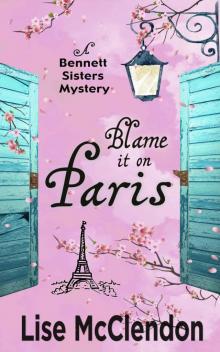 Blame it on Paris (Bennett Sisters Mysteries Book 7)
Blame it on Paris (Bennett Sisters Mysteries Book 7)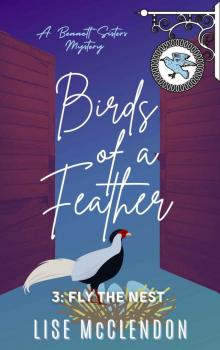 Birds of a Feather: 3: Fly the Nest (Bennett Sisters Mysteries Book 16)
Birds of a Feather: 3: Fly the Nest (Bennett Sisters Mysteries Book 16)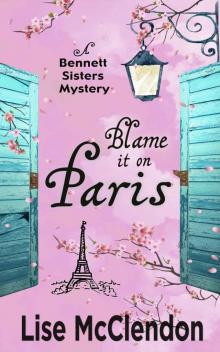 Blame it on Paris
Blame it on Paris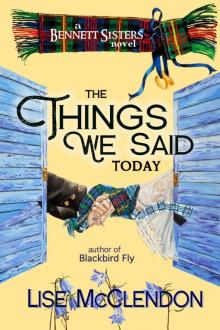 The Things We Said Today
The Things We Said Today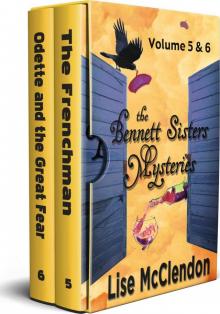 Bennett Sisters Mysteries Volume 5 & 6
Bennett Sisters Mysteries Volume 5 & 6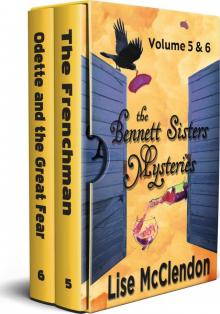 Bennett Sisters Mysteries Box Set 2
Bennett Sisters Mysteries Box Set 2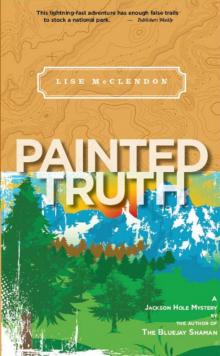 Painted Truth
Painted Truth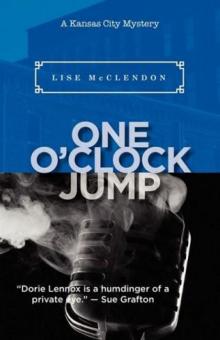 One O'Clock Jump
One O'Clock Jump The Bluejay Shaman (Alix Thorssen Mystery Series)
The Bluejay Shaman (Alix Thorssen Mystery Series)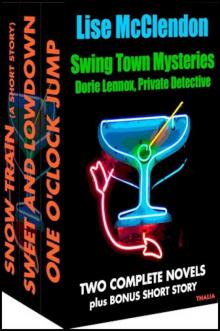 Swing Town Mysteries Dorie Lennox Box Set
Swing Town Mysteries Dorie Lennox Box Set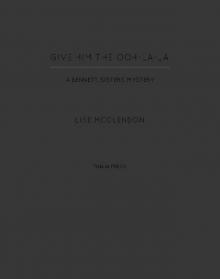 Give Him the Ooh-la-la
Give Him the Ooh-la-la Blackbird Fly
Blackbird Fly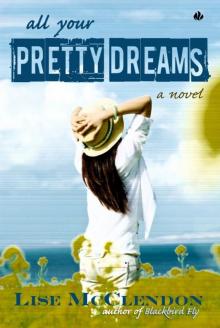 All Your Pretty Dreams
All Your Pretty Dreams Nordic Nights (The Alix Thorssen Mysteries)
Nordic Nights (The Alix Thorssen Mysteries)